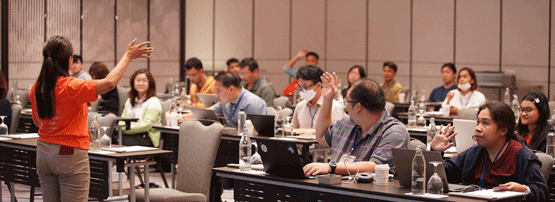
Members and the community will begin seeing some changes to APNIC’s Internet development initiatives in the coming months as the organization embraces its new Development strategy announced as part of the June organizational realignment.
With a primary focus to improve the deployment and management of Internet number resources in the region, modifications will soon be made to the training curriculum, training labs, online Academy platform, Community Trainer program, and M-Root deployment support.
Training curriculum
A review of the training curriculum was completed in August, with the aim to ensure that APNIC is focusing on relevant training topics that align with the revised strategy. Core topics such as IPv6 and RPKI; foundational subjects such as routing, Internet resource management, and DNS/DNSSEC; and critical areas such as network security and IXP operation all remain in the curriculum.
Optional topics, such as content related to SDN/MPLS, network automation, information security and network management and monitoring will transition out of APNIC’s instructor-led curriculum in 2026. A series of train-the-trainer sessions will be held next year around the region on these optional topics, to help the community lead this training in future using APNIC’s content.
Training labs
As part of instructor-led training in recent years, APNIC has used a mixture of training labs hosted on our own equipment and virtual training labs hosted by third-party cloud providers. With a reduced development budget in 2026, APNIC has decided to shift all instructor-led training labs to our own data centre presence in Singapore and Australia from 2026. Our labs equipment will be upgraded this year to handle the expected increased load.
Community Trainer Program
Community trainers have informally supported APNIC training for many years, and formally since 2016 with the creation of the Community Trainer (CT) program. This program has seen experts from the community volunteer their time to assist with training on technical topics, and in 2022, an additional type of community trainer was added, the Retained Community Trainer (RCT). These trainers were paid a retainer to deliver a certain amount of training each year to help expand the reach of APNIC’s capacity building.
A review of the CT program that focused on cost-effectiveness was included in the 2025 Activity Plan, and this review has now concluded. As a result, APNIC’s CT program will return to a voluntary-only model in 2026. Current RCTs have been invited to join the new CT program and I’m pleased to share that several have already indicated their intention to do so.
Academy platform
While the results of the curriculum review will see some content transition away from APNIC’s instructor-led training, there will be no immediate change to the self-paced course curriculum on the Academy website. This means the current catalogue of nine self-paced courses and 64 webinars remain available as normal.
However, preparations are underway to reduce the available virtual labs on the Academy platform from October 2025 to a smaller number related to core curriculum topics such as RPKI, IXPs and IPv6. The number of virtual labs available on the Academy from January 2026 is subject to change depending on the forecast available budget.
The ongoing development work to modernize the underlying architecture of the online Academy will continue this year and into 2026 to ensure the learning platform remains scalable and maintainable into the future.
M-Root deployment and IXPs
APNIC will continue to work with WIDE Project and JPRS in the deployment of M-Root server instances in the region in 2026. However, our role will change to focus on the identification and introduction of potential root server sites, with the current administrative support to be transitioned to JPRS with APNIC Foundation’s assistance.
Supporting IXP deployment in the region remains a focus, including working with partners such as ISOC and others.
Looking ahead
Throughout this transition period, APNIC will continue to support infrastructure deployment and deliver training in the community. In the first half of this year alone, APNIC delivered 67 instructor-led courses to 1,761 participants, while a further 842 people completed 1,692 self-paced courses on the Academy platform. Seventeen technical assistance requests were supported, with two RIPE Atlas anchors deployed and an additional four M-Root sites identified.
We look forward to continuing to support Internet development in the region as we prepare for a more focused plan of activities in 2026.
The views expressed by the authors of this blog are their own and do not necessarily reflect the views of APNIC. Please note a Code of Conduct applies to this blog.
